

HF Myheartmylife. Three young people living with heart disease share how they are dealing with COVID-19. When The Heart Gets Heavy: Emotional Wellbeing and Heart Conditions Emotional wellbeing is like having a garden, sometimes it grows green on its own, other times it needs watering, cutting back or fertilising....

Acute rheumatic fever and rheumatic heart disease The Australian Guideline for Prevention, Diagnosis and Management of Acute Rheumatic Fever and Rheumatic Heart Disease (2nd Edition).... Absolute CVD risk assessment resources. Lack of heart machine behind four babies' deaths in four weeks at Adelaide hospital, committee hears. The deaths of four babies at Adelaide's Women's and Children's Hospital in the past month could have been prevented if the right cardiac treatment had been available, a South Australian Parliament committee has heard.
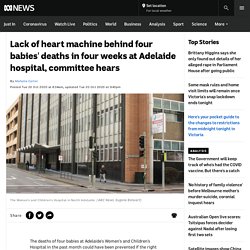
Key points: Adelaide's Women's and Children's Hospital does not have an external oxygenation machineBabies who would normally travel to Melbourne to use one cannot currently do thatA doctor says four babies have died because of a lack of cardiac treatment John Svigos, the convenor of a group called the Women's and Children's Hospital Alliance, told the Select Committee on Health Services Adelaide was the only mainland state capital without onsite cardiac treatment or external oxygenation machines (ECMOs) available for babies and children.
Children who would normally have emergency transfers to Melbourne's Royal Children's Hospital for the treatment are currently unable to because of coronavirus restrictions on re-entering South Australia from Victoria. Other concerns raised. Understanding congenital heart disease. Each year in Australia, it is estimated 2,400 babies are affected with congenital heart disease.
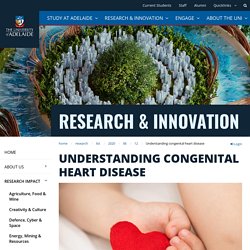
People with complex and severe congenital heart disease require specialist treatment throughout their life. Understanding congenital heart disease and the factors that impact the maternal environment prior to and during pregnancy will be the focus for researchers at the Robinson Research Institute, after being awarded $3 million in funding from the Federal Government’s Medical Research Future Fund (MRFF).
Professor Michael Davies from the Lifecourse and Intergenerational Health Research Group says congenital heart defects affect the normal function of the heart, and are present at birth. Heart Transplantation in Congenital Heart Disease: In Whom to Consider and When? Pulmonary Valve Stenosis. What is it?
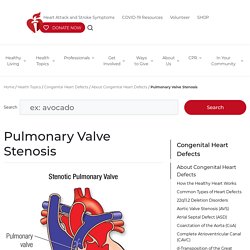
A thickened or fused heart valve that does not fully open. The pulmonary valve allows blood to flow out of the heart, into the pulmonary artery and then to the lungs. More information for parents of children with pulmonary valve stenosis. Heart abnormality birth defects. How the heart works Approximately one in every 100 babies is born with a heart defect.
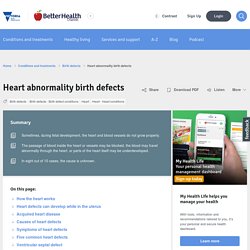
This is called a congenital heart defect (CHD). Some defects are mild and cause no significant disturbance to the way the heart functions. However, more than half of all children with CHD have a condition that is serious enough to require treatment. HeartKids - Congenital Heart Disease. Congenital heart disease (CHD) is the most common congenital disorder in newborns.
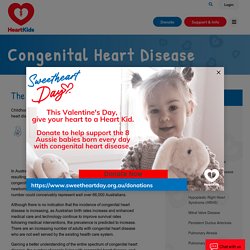
The birth rate prevalence of congenital heart disease is understood to be approximately 8 – 10 cases per 1,000 live births. In Australia, there are approximately 300,000 registered births per year resulting in 2,400 – 3,000 babies born each year with a form of congenital heart disease. Cumulatively, taking into consideration newborns through to adults living with congenital heart disease, this number could conceivably represent well over 66,000 Australians. Although there is no indication that the incidence of congenital heart disease is increasing, as Australian birth rates increase and enhanced medical care and technology continue to improve survival rates following medical interventions, the prevalence is predicted to increase.
Heart Disease: Diagnosis & Tests. Factors That May Lead to a Congenital Heart Defect (CHD) What causes a congenital heart defect (CHD)?
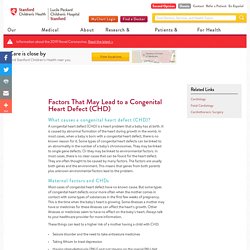
A congenital heart defect (CHD) is a heart problem that a baby has at birth. It is caused by abnormal formation of the heart during growth in the womb. In most cases, when a baby is born with a congenital heart defect, there is no known reason for it. Some types of congenital heart defects can be linked to an abnormality in the number of a baby’s chromosomes. They may be linked to single gene defects. Dr Christopher Kirby. I am a Fellow of the Royal Australasian College of Surgeons, consulting in Paediatric Surgery for the past fifteen years.
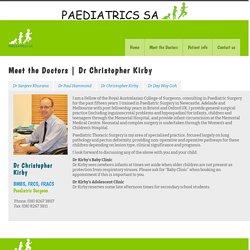
I trained in Paediatric Surgery in Newcastle, Adelaide and Melbourne with post fellowship years in Bristol and Oxford UK. I provide general surgical practice (including inguinoscrotal problems and hypospadias) for infants, children and teenagers through the Memorial Hospital, and provide infant circumcision at the Memorial Medical Centre. Neonatal and complex surgery is undertaken through the Women’s and Children’s Hospital. Paediatric Thoracic Surgery is my area of specialised practice, focused largely on lung pathology and pectus deformity, providing non-operative and operative pathways for these children depending on lesion type, clinical significance and prognosis. Doctor Andrew Kelly - Cardiologists. Dr Andrew Kelly MBBS DCH(Adel.)
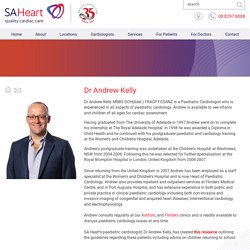
FRACP FCSANZ is a Paediatric Cardiologist who is experienced in all aspects of paediatric cardiology. Andrew is available to see infants and children of all ages for cardiac assessment. Having graduated from The University of Adelaide in 1997 Andrew went on to complete his internship at The Royal Adelaide Hospital. Congenital heart disease - Types. Congenital heart disease refers to a range of possible heart defects.
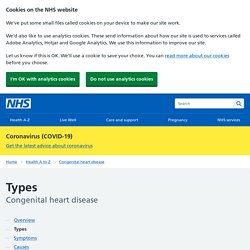
Aortic valve stenosis Aortic valve stenosis is a serious type of congenital heart defect. SA Health investigating after 'cluster' of four babies die at Adelaide hospital in one month. A review is underway into the deaths of four babies within a month at Adelaide's Women's and Children's Hospital amid concerns a lack of specialist cardiac surgery facilities may have contributed. Deputy Chief Public Health Officer Michael Cusack says such a cluster of cases over a short period of time is concerning. He said the hospital would expect to report only six to 10 such cases, of very young infants with serious heart problems, each year. "Where we see four babies in a cluster, that is a cause for further investigation," Dr Cusack said. "As a parent, whenever you read about adverse events in children, it's always hard. "So my heart really does go out to each of the parents and families that have been affected by this. Cardiovascular disease, Deaths from cardiovascular disease.
Aboriginal and Torres Strait Islander people In 2016–2018, there were around 2,000 deaths from CVD among Aboriginal and Torres Strait Islander people, a crude rate of 93 deaths per 100,000 population. After adjusting for differences in the age structure of the populations, the rate of death from CVD was 1.7 times as high among Indigenous Australians compared with non-Indigenous Australians. The difference between Indigenous and non-Indigenous Australians was higher among females (1.8 times higher among Indigenous Australians) than males (1.6 times higher among Indigenous Australians).
Coronary heart disease In 2018, coronary heart disease (CHD) was the underlying cause in around 17,500 deaths (11% of all deaths and 42% of CVD deaths). “Congenital heart health”: how psychological care can make a difference. An integrated approach incorporating both physical and mental health is critical to “congenital heart health” Congenital heart disease (CHD) affects more than 2400 Australian babies each year. It is the most common cause of admission to paediatric intensive care in the neonatal period,1 a leading cause of infant death2 and one of the leading causes of disease-related disability in children under 5 years of age.3 In Australia and around the world, the landscape of CHD care is rapidly evolving.
National strategic action plan for childhood heart disease. Congenital heart disease in Australia , Summary. Congenital heart disease is a general term for any defect of the heart, heart valves or central blood vessels that is present at birth. Most congenital heart disease is multifactorial and arises through combinations of genetic and environmental factors. People with complex and severe congenital heart disease require specialist treatment throughout their life. Heart Kids - ABC (none) - Australian Broadcasting Corporation. It is hard to imagine but eight children a day are born with childhood heart disease in Australia, and each week four don't survive. Yet childhood heart disease, otherwise known as CHD or congenital heart disease, remains one of the most misunderstood and misrepresented health related issues in Australia.
It is the biggest cause of death of babies under 12 months of age, yet has no known cure. This year for Valentines Day, Heart Kids is asking us all to support these tiny hearts as part of its national Sweetheart Day awareness and fundraising campaign. National strategic action plan for childhood heart disease. Congenital heart disease in Australia , Summary. Dr Darren Hutchinson - Paediatric Cardiologist - Parkville.
Factors That May Lead to a Congenital Heart Defect (CHD) Five heart surgeries for woman with congenital disease not enough to miss Splendour. Congenital heart disease in adults. Can You Be Cured of Congenital Heart Disease? New research shines light on the formation of heart defects in babies. Mystery surrounds congenital heart defects - ABC News (Australian Broadcasting Corporation) Heart Kids - ABC (none) - Australian Broadcasting Corporation. Babytalk: Heart Kids - Babytalk - ABC Radio.